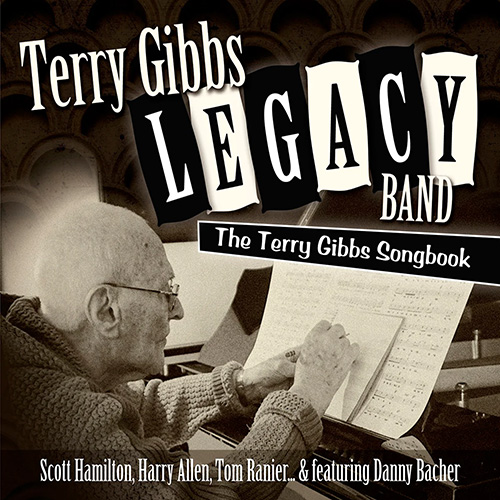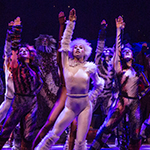Terry Gibbs Legacy Band
The Terry Gibbs Songbook
(Whaling City Sound)
June 28, 2023
Reviewed by Alix Cohen

Ninety-eight-year-old Terry Gibbs started writing composing music in 1948 when he joined Buddy Rich’s big band. There are about 200 extant to date. This, he says, will be his last CD, “and I feel like a winner.” Joining Gibbs, who here plays a two-finger piano, is his dream band: Scott Hamilton (tenor sax), Harry Allen (tenor sax), Tom Ranier (piano), Mike Gurrola (bass), Gerry Gibbs (drums), and Danny Bacher (vocals).
“Let’s Go to Rio” is frisky. A quick-fingered piano suggests short Carnival steps; the phrasing effortlessly follows suit. It’s casual and coltish. “Stay with Me Tonight” is presented as a samba invitation. The piano showcases precision and finesse, and the music evokes bright colors—fauna, parrots, whipped skirts. This one gradually fades as if the procession’s moving on. In contrast, “I Was Loved” arrives as a sensitive musing, with Bacher’s tenor voice radiating light tails.
“In my gentle wa-hey,” he sings. The sax caresses. (All these have lyrics by Michael Dees.)
“Now’s the Time to Groove” opens with somersaulting percussion and a swinging piano. It comes from the hip and suggests: “Now’s the time to groove/Let’s go down and hear some good jazz.” It’s a name-dropper, a recollection of talented, past friends. “Hey, Danny,” Gibbs interjects making the cut sound like a jam. “Wow, was that a night!” They kibitz. “He plays like he’s 97!” Bacher declares. It must’ve been fun.
A rueful “The House That Might’ve Been” (lyric by Arthur Hamilton) emerges as a fox trot. “You’re not here to tuck me in/But in my mind, I’m in the house that might’ve been.” The saxes create musical shadows. The song is played dance-like, but could easily morph to torch with a different arrangement. Bacher is ardent.
“I Can Hardly Wait for Saturday Night” (lyric by Steve Allen) is cool and insouciant. The rhythm conjures Fosse-type moves—exaggerated gestures, sliding feet in two-tone shoes. One sax swaggers, the other struts. “My life was a big bowl of cherries then she started actin’ detached/Don’t count your chickens before they’re hatched.” Universal advice. The vocalist seems to shrug and then returns his hands to his pockets.
The sax is seductive on “If I Were You” (“I’d fall in love with me”) (lyric by Arthur Hamilton). It seems to coo “Come on, honey, you know I’m right.” The piano sighs. “Wouldn’t you try hard to make this happen if you were me?,” Bacher plaintively sings. “Lonely Days” (lyric by Michael Dees) tiptoes in on the piano; the vocal and sax are downy. You’ll want to wrap yourself in this one as if it were a cashmere shawl.
“Sweet Young Song of Love” (lyric by Jerry Gladstone) is a bossa nova: “We’re every spring the summer’s jealous of/The sands of time can never age our sweet young love.
” The instrumental is rich, expansive, and exuberant.
This is 1950s jazz, which is not to say it’s anachronistic, but rather that the feel is classic rather than contemporary. The musicians are top notch, and who would be a better choice for vocals than Danny Bacher, whose musical DNA is of an older vintage than Gibbs himself.





